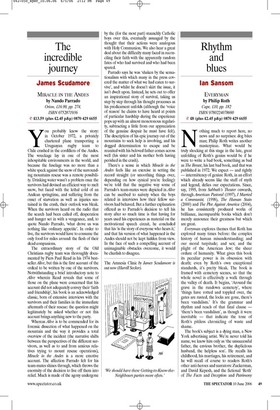The incredible journey
James Scudamore
MIRACLE IN THE ANDES by Nando Parrado Orion, £16.99, pp. 274, ISBN 0752871936 ✆ £13.59 (plus £2.45 p&p) 0870 429 6655 You probably know the story: in October 1972, a privately chartered plane transporting a Uruguayan rugby team to Chile crashed in the cordillera of the Andes. The wreckage lay in one of the most inhospitable environments in the world, and because the fuselage was no more than a white speck against the snow of the surrounding mountains rescue was a remote possibility. Drinking water wasn’t a problem once the survivors had devised an efficient way to melt snow, but faced with the lethal cold of an Andean springtime, and suffering from the onset of starvation as well as injuries sustained in the crash, their outlook was bleak. When the survivors heard on the radio that the search had been called off, desperation and hunger set in with a vengeance, and, to quote Nando Parrado, ‘what drove us was nothing like ordinary appetite’. In order to live, the survivors would have to consume the only food for miles around: the flesh of their dead companions.
The extraordinary story of the Old Christians rugby team was thoroughly documented by Piers Paul Read in his 1974 bestseller Alive, but this is the first account of the ordeal to be written by one of the survivors. Notwithstanding a brief introductory note to Alive wherein Read reveals that some of those on the plane were concerned that his account did not adequately convey their ‘faith and friendship’, his book is an acknowledged classic, born of extensive interviews with the survivors and their families in the immediate aftermath of their rescue: the question might legitimately be asked whether or not this account brings anything new to the party.
Whereas Alive is to be commended for its forensic dissection of what happened on the mountain and the way it provides a total overview of the incident (the narrative shifts between the perspectives of the different survivors, as well as to and from anxious relatives trying to mount rescue operations), Miracle in the Andes is a more emotive account. The affection Parrado felt for his team-mates shines through, which throws the enormity of the decision to live off them into relief. Much is made of the agony undergone by the (for the most part) staunchly Catholic boys over this, eventually assuaged by the thought that their actions were analogous with Holy Communion. We also hear a great deal about the difficulty many faced in reconciling their faith with the apparently random fates of who had survived and who had been spared.
Parrado says he was ‘shaken by the sensationalism with which many in the press covered the matter of what we had eaten to survive’, and whilst he doesn’t skirt the issue, it isn’t dwelt upon. Instead, he sets out to offer an inspirational story of survival, taking us step by step through his thought processes as his predicament unfolds (although the ‘voice of reason’ he claims to have heard at points of particular hardship during the experience pops up with an almost monotonous regularity, subtracting a little from our appreciation of the genuine despair he must have felt). The description of his epic journey out of the mountains to seek help is involving, and his dogged determination to escape and be reunited with his beloved father comes across well (his sister and his mother both having perished in the crash).
There’s a sense in which Miracle in the Andes feels like an exercise in setting the record straight (or smoothing things over, depending on how cynical you’re feeling): we’re told that the negative way some of Parrado’s team-mates were depicted in Alive can be ascribed to naivety when the boys related in interviews how their fellow survivors had behaved. But a further explanation offered as to Parrado’s decision to tell his story after so much time is that having for years used his experiences as material on the motivational speech circuit, he concluded that his ‘is the story of everyone who hears it,’ and that his version of what happened in the Andes should not be kept hidden from view. In the face of such a compelling account of unimaginable obstacles overcome, it would be churlish to disagree.


















































































 Previous page
Previous page